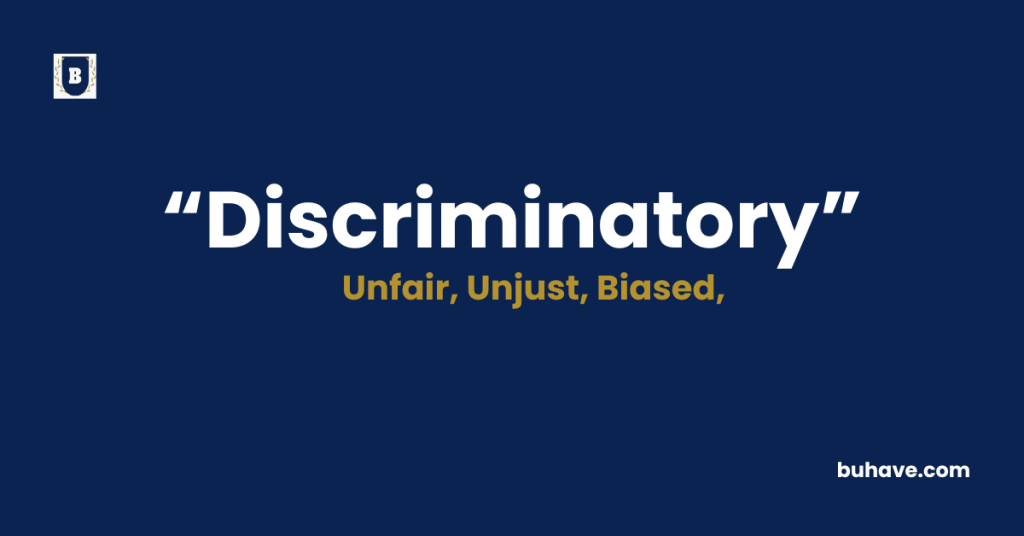The word ‘Discriminatory’ (Adjective) refers to actions, policies, or behaviors that show bias or prejudice against individuals or groups, often resulting in unfair treatment. In this guide, you’ll learn the full definition, synonyms, antonyms, etymology, and real-life examples of how to use ‘Discriminatory’ correctly in sentences.
Discriminatory Explained in Depth
A complete and detailed guide to the word Discriminatory including meaning, definition, examples, etymology, synonyms, and antonyms.
Meanings of Discriminatory
‘Discriminatory’ describes conduct that treats people unfairly based on characteristics like race, gender, age, religion, or other factors. It implies an unjust or prejudiced distinction made between different categories of people.
Definition
Discriminatory (adjective): showing or involving an unfair or prejudicial distinction between different categories of people or things, especially on the grounds of race, age, or gender.
Etymology
The word ‘Discriminatory’ comes from the Latin root discriminare, meaning “to divide or distinguish,” and evolved through the verb ‘discriminate.’ The adjective form emerged in the early 19th century to describe prejudicial treatment.
Example Sentences
- The company’s hiring practices were found to be discriminatory against older applicants.
- They filed a lawsuit over discriminatory policies at their workplace.
- Discriminatory laws were abolished in favor of more inclusive legislation.
- Gender-based pay gaps are a form of discriminatory behavior.
- Any discriminatory remarks will not be tolerated in this classroom.
Discriminatory Synonyms
- Prejudiced
- Biased
- Unfair
- Inequitable
- Bigoted
- Racist
- Sexist
- Partial
- Exclusionary
- Unequal
Discriminatory Antonyms
- Fair
- Unbiased
- Equitable
- Inclusive
- Impartial
- Just
- Objective
- Balanced
- Neutral
- Open-minded
FAQs about Discriminatory
Here’s a FAQ-style guide about the word “Discriminatory”
1. What are common forms of discriminatory behavior?
Discriminatory behavior can include racism, sexism, ageism, religious intolerance, and unequal treatment in education or employment.
2. Is ‘discriminatory’ always negative?
Yes, in modern usage it typically carries a negative connotation related to injustice or prejudice.
3. Can institutions be discriminatory?
Yes. Laws, policies, or systems can be described as discriminatory if they result in unfair treatment of certain groups.
4. What’s the difference between ‘discriminate’ and ‘discriminatory’?
‘Discriminate’ is a verb meaning to distinguish or treat differently; ‘discriminatory’ is an adjective describing biased or unjust actions.
5. How do you pronounce ‘discriminatory’?
It is pronounced /dɪˈskrɪmɪnəˌtɔːri/ or /dɪˈskrɪmənəˌtɔːri/.

















